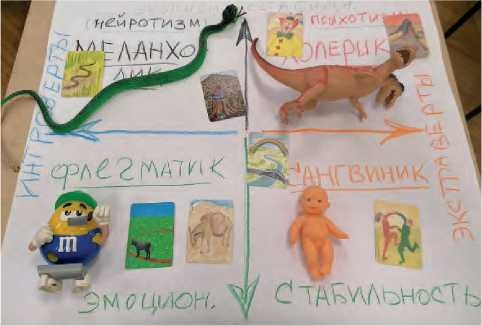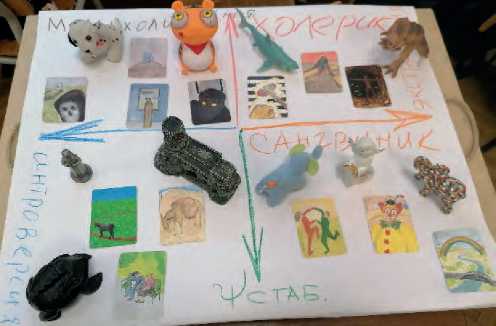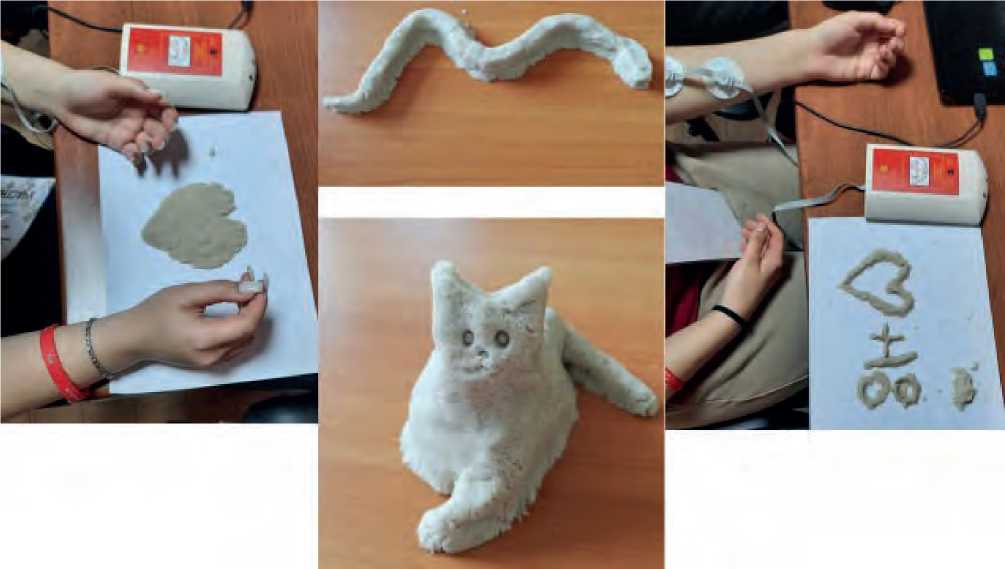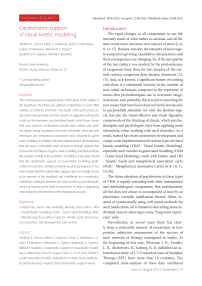Cardiometric support of visual kinetic modeling
Автор: Zernov V.A., Lobanova E.V., Likhacheva E.V., Nikolaeva L.P., Ognev A.S., Ogneva N.A., Rudenko M.Y.
Журнал: Cardiometry @cardiometry
Рубрика: Short review
Статья в выпуске: 23, 2022 года.
Бесплатный доступ
The article presents an experimental confirmation of the validity of the hypothesis that there are optimal combinations of such VKM varieties as GSM, KS and MAC. The results of the performed cardiometric measurements and the variants of subjective self-reports made by the examinees are described herein, which have shown that such optimal combinations include tasks, where and when the clients, acting as patients, first work with kinetic sand and only thereupon use metaphorical associative cards, followed by game sand modeling. In addition, the data obtained have demonstrated that the least comfortable work sequences include options that first use the techniques of game sand modeling, and then as those the varieties of VKM as KS and MAC. In addition, it has been found that the cardiometric support of visual kinetic modeling significantly increases the confidence therein by all its participants. It has been shown that the cardiometric support also successfully serves as an element of bio-feedback and contributes to a meaningful, substantive, dialogue between the client and the psychotherapist, aimed at increasing the level of awareness of what is happening and raising the effectiveness of the therapeutic process.
Cardiometry, heart rate variability, baevsky stress index, vkm - visual kinetic modeling, gsm - game sand modeling, mac - metaphorical associative cards, ks - kinetic sand, psychological correction, self-development, self-control
Короткий адрес: https://sciup.org/148326569
IDR: 148326569 | DOI: 10.18137/cardiometry.2022.23.4145
Текст научной статьи Cardiometric support of visual kinetic modeling
Vladimir A. Zernov, Elena V. Lobanova, Elvira V. Likhacheva, Lyubov P. Nikolaeva, Aleksandr S. Ognev, Nadezhda A. Ogneva, Mikhail Y. Rudenko. Cardiometric support of visual kinetic modeling. Cardiometry; Issue 23; August 2022; p. 41-45; DOI: 10.18137/ cardiometry.2022.23.4145; Available from:
The rapid changes in all components in our life intensify much of what makes us anxious, and all the time create more and more new sources of stress [1-6, 8, 12-17]. Besides, not only the intensity of such negative impacts is growing. Qualitative characteristics and their consequences are changing. So, if the last quarter of the last century was marked by the predominance of exogenous fears, then for two decades of the current century, exogenous fears became dominant [12, 13]. And, as is known, a significant feature of working with them is a substantial increase in the number of non-verbal techniques compared to the repertoire of means that psychotherapists use to overcome exogenous fears, and, probably, this has led to searching for new means that have been observed in the last decade, to purposefully stimulate not only the abstract-logical, but also the visual-effective and visual-figurative components of the thinking of clients, which psychotherapists and psychologists have been applying more extensively, when working with such disorders. As a result, started have been an intensive development and a large-scale implementation of various types of visual kinetic modeling (VKM - Visual Kinetic Modeling), especially such varieties as game sand modeling (GSM - Game Sand Modeling), work with kinetic sand (KS - Kinetic Sand) and metaphorical association cards (MAC - Metaphorical Associative Cards) [6-8, 10, 11, 14-20].
The closer attention of practitioners to these types of VKM is rapidly extending both their instrumental and methodological components. But, unfortunately, all this does not always is accompanied at least by an elementary scientific justification thereof. Often, instead of systematically using well-tested methods for such justification, all is limited to describing some individual cases or referring to some “long-term experience” only.
Nevertheless, in recent years there has clearly been a noticeable interest of researchers in how positive subjective assessments of the success of such methods of therapy correspond to reality. At the beginning of this year, Wiersma, J. K., Freedle, L. R., McRoberts, R., Solberg, K. B. published an international study of 1,715 reported cases of Sandplay Therapy (SPT) from more than 16 countries. The completed meta-analysis of these data confirmed the effectiveness of using SPT in the treatment of patients of various ages who sought help due to various mental health problems [14]. Previously, similar successes were reported in the use of sand therapy in relation to phobic spectrum disorders [15] and in relation to work with traumatic stress of migrants with disabilities in that category of patients for long-term psychotherapy, who also have language problems in communicating with therapists [11].
The number of studies on the effectiveness of VKM, using not only conventional tests, but also employing modern instrumental methods for objective monitoring of the psycho-physiological state of clients, has been gradually increasing [2-11, 14-20]. Thus, applying proton magnetic resonance spectroscopy, a positive change in the metabolic processes in the brain was shown in patients suffering from Generalized Anxiety Disorder (GAD - Generalized Anxiety Disorder) after they had completed the Sandplay Therapy (SPT) course [4]. There is a growth in the number of publications on the successful applications of various individual components of VKM by assessing heart rate variability [7, 10, 16-20].
Despite the emerging positive dynamics of the scientific substantiation of the effectiveness of VKM, it is necessary to recognize that there is still a minor share of works devoted thereto that use instrumental means for an objective assessment of the results obtained. In addition, almost all such studies were carried out, as a rule, using separate groups of VKM, and so far there is no answer if all of its components listed are compatible. In this regard, we organized a series of studies aimed at testing the hypothesis of the existence of optimal combinations of such varieties of VKM like GSM, KS and MAC, based on the instrumental diagnostics methods, when using as means of prompt correction of a person’s psycho-emotional state.
Materials and methods
In the studies aimed at testing the hypothesis presented above, a total of 117 test subjects took part. Among them there were students and teachers from some Moscow universities who undertake educational programs both the humanities and engineering profiles.
The initial stage of our research was to familiarize the test subjects with the G. Eysenck test questionnaire (EPQ, Eysenck Personality Questionnaire), which is used to assess the grade of expression of extraversion 42 | Cardiometry | Issue 23. August 2022
and introversion, neuroticism and psychotism in a person. Then each test subject was asked to pick up several figurines and metaphorical associative cards, which might illustrate the studied personality characteristics and correspond to one of the most popular classifications of human temperament types: choleric, melancholic, phlegmatic and sanguine. After that, each test subject had to determine which of types of the temperament he considered the most suitable for himself personally and which was the least characteristic to him. Then it was proposed to sculpt figurines from kinetic sand that corresponded to the characteristics of those two types of the temperament, served as their materialized metaphors. Examples of the tasks are shown in Figure 1 herein.
The final stage of those sets of experiments was the cardiometric recording of the reactions of the test subjects to the metaphorical designations they chose for the indicated types of the temperament. For that purpose, in the process of focusing the test subject’s attention on such stimuli, a cardiogram was recorded using PC-assisted cardiac analyzer CARDIOCODE, the software of which allows automatically determining values of stress index (SI) of the vegetative-vascular system according to the Baevsky method.
Results and Discussions
For more than half of the test subjects, when fixing attention on the metaphorical images of the type of temperament they considered to be the most consistent with their ideas about themselves, the SI indicators varied on average in the range from 220 to 580 arbitrary units. When fixing attention on the metaphorical symbols of the opposite temperament, the indicators of SI ranged from 360 to 2100 arbitrary units. For each test subject from that group, the SI indicators increased on average by one and a half to two times. At the same time, in post-test conversations, they, as a rule, described their feelings during the transition from metaphors of their conditionally inherent temperament to metaphorical images of a completely unusual temperament for them as an unpleasant excitation. Previously, similar results were obtained by us when assessing the possibility of using heart rate variability indicators to reveal hidden information and determine the subjective preferences of the test subjects [2, 6, 7, 9, 16-20].
About ten percent of the test subjects demonstrated their diametrically opposite dynamics. In the



Figure 1. Examples of metaphorical illustrations of various temperament types according to the tasks of the experimenter, selected by test subjects
transition from working with metaphors of their characteristic temperament to metaphors of another temperament, which they considered the least typical to them, the SI indicators decreased on average by one and a half to two times and were found in the range of 110-270 arbitrary units. At the same time, in the course of post-test conversations, they, as a rule, described their feelings during the transition from metaphors of their conditionally inherent temperament to metaphorical images of a completely unusual temperament as something that made them alert, as a kind of stupor etc.
Slightly more than a quarter of the test subjects in the course of similar measurements showed a mixed reaction. With respect to some metaphorical images, for those test subjects we obtained higher SI values, and with respect to others we recorded the decreased ones. But at the same time, as a rule, the difference was at least 25-30%. In post-test conversations, the test subjects in that group tended to show a greater uncertainty that they had correctly identified their own temperament, or doubts that they had chosen the appropriate metaphors for the types of the temperament described.
In all above groups, the vast majority of the test subjects noted that it was easiest for them to work with toy miniatures for sand modeling. According to them, the selection of suitable figurines occurred in this case, as it were, “by itself”. It was noteworthy that it was for that kind of metaphorical description of “one’s own” and “not of one’s own” temperament that the maximum difference in the SI indicators was obtained. The most difficult thing was the metaphorical designation of temperaments with the help of kinetic sand. For this variety, the most controversial indications of SI were obtained, that, possibly, was also associated with the involuntary desire of the test subjects to perform physical manipulations with the figurines they created.
During the surveys, the test subjects noted that the sequence of tasks turned out to be the most convenient for them, when they first worked with kinetic sand, then with metaphorical associative cards and ended with figurines for game sand modeling. It is precisely this sequence that has been capable of producing monotonous changes in the indices of SI. By the category of the least comfortable sequences of work, most of the test subjects were assigned options in which first was the use of toy miniatures for sand play simulation.
When analyzing photographs of the selections of the toy figurines made by the test subjects for a metaphorical description of various types of the temperament, a high rate of use of the same or similar in the appearance and content toy miniatures was found (for example, figurines of fiercely attacking dinosaurs to denote choleric people, friendly characters to denote sanguine people, slowly crawling turtles for the phlegmatic, or the same or similar sad characters for the melancholic). A similar repetition was observed in relation to the used metaphorical associative cards. Of particular significance to this result is the fact that, under the conditions of the experiment, the test subjects have made their choice staying in the room alone. None of them saw the results of their predecessors, or what the test subjects who came after them did. At the same time, each had more than one and a half thousand toy miniatures and over three thousand metaphorical associative cards at the disposal. This result is consistent with the data we have obtained when evaluating the applicability of heart rate variability measurements as a means of objectively monitoring the results of using such VKM varieties as GSM and MAC [16, 18-20].
Unexpected is the desire of many test subjects to emphasize their high interest in this form of training. They also have noted that participation in this kind of research helps to better understand the essence of the various types of VKM used in therapeutic and advisory practice. This has been cited as an important argument in favor of the contact forms of such classes in comparison with the more conventional and seemingly preferable online learning during the pandemic.
Conclusions
In the course of the conducted research, an experimental confirmation of the validity of the hypothesis that there are optimal combinations of such VKM varieties as GSM, KS and MAC has been obtained. The performed cardiometric measurements and the subjective self-reports prepared by the test subjects have shown that such optimal combinations include tasks, where the clients, acting as patients, first work with kinetic sand and thereupon only use metaphorical associative cards, followed by game sand modeling. In addition, the data obtained have demonstrated that the least comfortable work sequences include options that first use the techniques of game sand modeling and then as such VKM varieties as KS and MAC.
It has been also found that the cardiometric support of visual kinetic modeling significantly increases the confidence of all its participants therein. Such support also successfully serves as an element of bio-feedback and contributes to a meaningful, substantive, dialogue between the client and the psychotherapist, aimed at increasing the level of awareness of what is happening and raising the effectiveness of the therapeutic process.
Statement on ethical issues
Research involving people and/or animals is in full compliance with current national and international ethical standards.
Conflict of interest
None declared.
Author contributions
The authors read the ICMJE criteria for authorship and approved the final manuscript.
Список литературы Cardiometric support of visual kinetic modeling
- Azarov AA, Brodovskaya EV, Bubnov AY, et al. Predictor mining: data application to social computing. SPIIRAS Proceedings. 2013;3(26):136-1.
- Brodovskaya EV, et al. Reverse techniques as a means of increasing the validity of the cardio-oculometric diagnostics. Cardiometry. 2021;18:33-7. DOI: 10.18137/cardiometry.2021.18.3337.
- Brodovskaya E, et al. Intelligent search for strategies to minimize the risks of internet communication of teens and youth. Advances in Intelligent Systems and Computing. 2021;1183:261-8. DOI: 10.1007/978-981-15-5856-6_26.
- Foo M, et al. The effect of sandplay therapy on the thalamus in the treatment of generalized anxiety disorder: A case report. International Journal of Play Therapy. 2020;29(4):191-200. DOI: 10.1037/pla0000137
- Ognev AS. Cardio-oculometric (cardio-oculographic) detection of functional states in a human individual. Cardiometry. 2019; 14: 104-5.
- Ognev AS, Likhacheva EV. Implementation of Positive Subjectivity Genesis in Higher Education System. Psychology. Journal of the Higher School of Economics. 2014;11(2): 51-67.
- Ognev AS, et al. Cardiometric detection of effects and patterns of emotional responses by a human individual to verbal, audial and visual stimuli. Cardiometry. 2019;14:79-86. DOI: 10.12710/cardiometry. 2019.14.7986.
- Ognev AS, et al. Cardiometric taxonomy of stress-inducing potential in diverse domestic situations. Cardiometry. 2019; 14:101-4.
- Ognev AS, et al. Use of cardiometry and oculography in concealed information detection. Cardiometry. 2019; 14: 87-95. DOI: 10.12710/cardiometry. 2019.14.8795.
- Ognev AS, et al. Validity of cardiometric performance data: an integral part of complex assessment of training session effectiveness. Cardiometry. 2019;14:96-100. DOI: 10.12710/cardiometry. 2019.14.96100.
- Roesler C. Sandplay therapy: An overview of theory, applications and evidence base. The Arts in Psychotherapy. 2019;64:84-94. DOI: 10.1016/j.aip.2019.04.001
- Rozenova MI, et al. Fear as a mental health crisis in the context of global risks and changes. Journal of Modern Foreign Psychology. 2021;10(1): 17-26. DOI: 10.17759/jmfp.2021100102.
- Rozenova MI, et al. Stress and fear in extreme situations. Journal of Modern Foreign Psychology. 2020; 9(1): 94-102. DOI: 10.17759/jmfp.2020090110.
- Wiersma JK, et al. (2022). A meta-analysis of sandplay therapy treatment outcomes. International Journal of Play Therapy. Advance online publication. DOI: 10.1037/pla0000180
- Yuan Yuan Liu, et al. Psychological symptoms and the use of shadow miniatures in sandplay therapy. The Arts in Psychotherapy. 2021. Volume 75, Article 101834. DOI: 10.1016/j.aip.2021.101834
- Zernov VA, et al. Cardiometric fingerprints of various human ego states. Cardiometry. 2019;15:38-42.
- Zernov VA, et al. Cardio-oculometric indicator of psychophysiological readiness of students to examinations. Cardiometry. 2020;16:28-34.
- Zernov VA, et al. Cardiometric evidence data on human self-control of emotional states in the context of the use of metaphoric associative cards. Cardiometry. 2020;16:55-61.
- Zernov VA, et al. The use of cardiometry in development of self-control skills by means of game sand modelling. Cardiometry. 2022;22:95-9. DOI: 10.18137/cardiometry.2022.22.9599
- Zernov VA, et al. Cardiometric confirmations of psychotherapeutic effectiveness of psychological sand modeling. Cardiometry. 2021;19:38-42. DOI: 10.18137/cardiometry.2021.19.3842.


